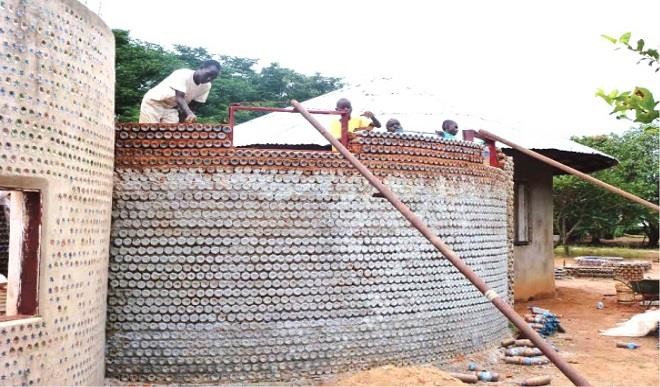Kaduna plastic house: From waste to shelter
Nigerians are not in the habit of recycling their waste unlike other countries where every household has organised waste collection systems for specific waste items. In Nigeria, anything not in use is simply discarded, usually with no consideration that they can be repurposed. It is on this premise that a non-governmental organization, Developmental Association for […]


Nigerians are not in the habit of recycling their waste unlike other countries where every household has organised waste collection systems for specific waste items. In Nigeria, anything not in use is simply discarded, usually with no consideration that they can be repurposed.
It is on this premise that a non-governmental organization, Developmental Association for Renewable Energy in Nigeria, through its creativity conceived the idea of building a plastic bottle house out of plastic containers collected from trash cans which could take over 200 years to decompose.
The world’s first ever plastic bottle house was constructed by Robert Bezeau in Bocas Del Toro, Panama. The two-bedroom home built with 10,000 plastic containers offered significant environmental benefits including temperatures that are 17°C making it cooler than outside.
However, the first West African plastic bottle house being constructed in Yelwa village along Kaduna-Zaria road, Kaduna State has continued to attract people as millions of plastic bottles are now being recycle towards building the house.
The NGO’s Chief Executive Officer (CEO), Engineer Yahaya Ahmed, said the house can withstand fire, bullets and earthquakes as well as adapt to all kinds of climate change and desertification situations.
He said, “The plastic bottle house can be constructed anywhere, even on water if a good and adequate foundation is prepared beforehand and it can last more than 200 years, irrespective of what circumstances may occur. It is 20 times stronger than brick walls and is bomb proof.”
Yahaya also said, “Constructing houses from cement and mud consume time and needs technical guide. But the bottles, even though filled with sand, are waterproof if securely capped.”
On how the house is constructed, he said, some preparation is needed before construction can commence including getting enough bottles and finding good or trained manpower to fill the bottles properly.
He added, “Such house is constructed by thousands of recycled plastic bottles which are filled with sand, cement, and mud and indeed these components form a highly formidable wall which is 20 times stronger than brick walls, fireproof, bulletproof, and earthquake resistant.
“This is the first of its kind in Nigeria, though we trained many students and youths who are replicating what they learnt at the centre in other places in Northern Nigeria. We are proud to be doing what we are doing, as all these will contribute in reducing the large numbers of plastic waste that are always thrown into the dustbin.”
Recycling plastic waste is said to be one of the best technologies in averting air pollution. The engineer however said, that as human population grows, the quantity of solid wastes generation also increases, and the government therefore needs to find a lasting solution to the challenges.
Local masons are being trained by the organisation in bottle-building technique, to enable them acquired more skills in house construction and be among the best in the next generation of houses through what they learnt during the training.
Yahaya in his appeal to Nigerians for support in bringing an end to deforestation and pollution in order to save the country from climate change also said, “We must join hands in tackling all the challenges affecting our environment.”
